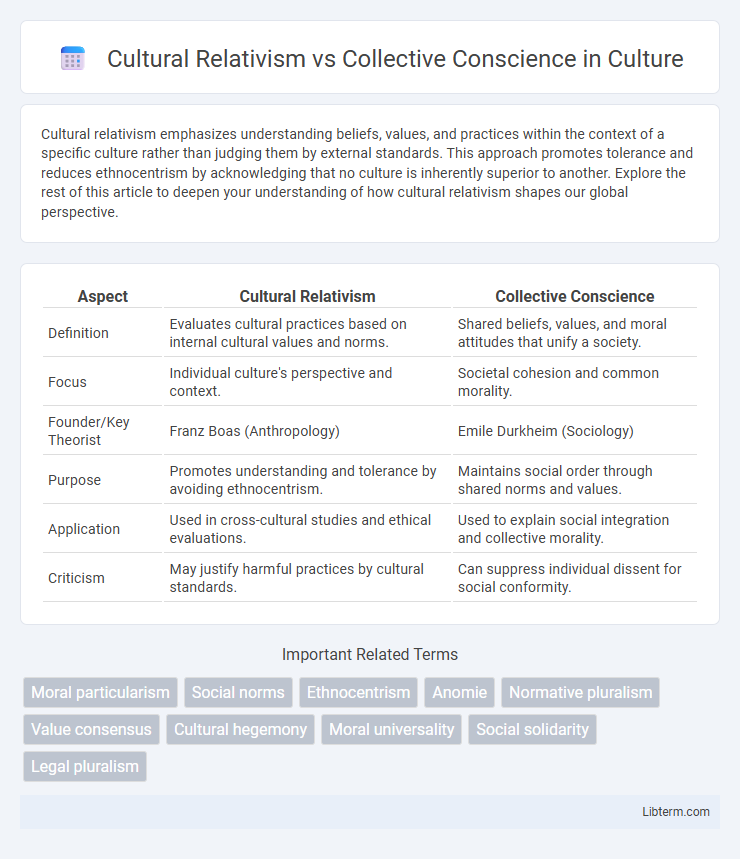Cultural relativism emphasizes understanding beliefs, values, and practices within the context of a specific culture rather than judging them by external standards. This approach promotes tolerance and reduces ethnocentrism by acknowledging that no culture is inherently superior to another. Explore the rest of this article to deepen your understanding of how cultural relativism shapes our global perspective.
Table of Comparison
| Aspect | Cultural Relativism | Collective Conscience |
|---|---|---|
| Definition | Evaluates cultural practices based on internal cultural values and norms. | Shared beliefs, values, and moral attitudes that unify a society. |
| Focus | Individual culture's perspective and context. | Societal cohesion and common morality. |
| Founder/Key Theorist | Franz Boas (Anthropology) | Emile Durkheim (Sociology) |
| Purpose | Promotes understanding and tolerance by avoiding ethnocentrism. | Maintains social order through shared norms and values. |
| Application | Used in cross-cultural studies and ethical evaluations. | Used to explain social integration and collective morality. |
| Criticism | May justify harmful practices by cultural standards. | Can suppress individual dissent for social conformity. |
Understanding Cultural Relativism
Understanding cultural relativism involves recognizing that beliefs, values, and practices are rooted in specific cultural contexts and cannot be judged by external standards. This concept contrasts with collective conscience, which emphasizes shared norms and moral values within a society that unify its members. Cultural relativism promotes empathy and reduces ethnocentrism by encouraging evaluation based on cultural meanings rather than universal criteria.
Defining Collective Conscience
Collective conscience refers to the set of shared beliefs, values, and moral attitudes that operate as a unifying force within a society. It shapes social norms and guides individual behavior by establishing a common sense of right and wrong. In contrast to cultural relativism, which emphasizes understanding cultures on their own terms, collective conscience highlights the unified ethical foundation underpinning social cohesion.
Historical Roots of Both Concepts
Cultural relativism emerged from early 20th-century anthropology, primarily shaped by Franz Boas, emphasizing the understanding of cultures within their own contexts to combat ethnocentrism. Collective conscience, introduced by Emile Durkheim in the late 19th century, refers to the shared beliefs and moral attitudes that unify members of a society, serving as a foundation for social cohesion. Both concepts reflect distinct approaches to understanding social norms, with cultural relativism focusing on cultural diversity and collective conscience highlighting societal integration.
Key Philosophers and Sociologists
Emile Durkheim is a central figure in the study of collective conscience, emphasizing the shared beliefs and moral attitudes that unify a society. In contrast, Franz Boas is renowned for promoting cultural relativism, arguing that one must understand cultural practices within their own context rather than through external standards. These perspectives highlight the tension between universal social norms and culturally specific worldviews in sociology and anthropology.
Core Principles: Comparison and Contrast
Cultural relativism emphasizes the understanding and evaluation of cultural norms and values based on the context of each unique society, rejecting ethnocentric judgments. Collective conscience, a concept from Emile Durkheim, refers to the shared beliefs, morals, and attitudes that unify members of a society, creating social cohesion and collective identity. While cultural relativism promotes tolerance and diversity across cultures, collective conscience underscores the importance of common values that maintain social order within a community.
Cultural Relativism: Strengths and Limitations
Cultural relativism promotes understanding and respect for diverse cultural practices by evaluating beliefs within their own social contexts, enhancing cross-cultural empathy and reducing ethnocentrism. Its strengths lie in fostering tolerance and challenging universal moral standards, yet it faces limitations by potentially excusing harmful practices and hindering social progress where human rights conflicts arise. Balancing cultural relativism with ethical considerations requires nuanced analysis to avoid moral paralysis while appreciating cultural diversity.
Collective Conscience in Modern Societies
Collective conscience in modern societies manifests as shared beliefs, values, and norms that foster social cohesion despite increasing cultural diversity. It functions through institutions like education, media, and legal systems, reinforcing common moral frameworks essential for social order. While cultural relativism emphasizes understanding diverse cultural norms, the collective conscience ensures unified social integration by promoting broadly accepted ethical standards.
Ethical Debates: Universalism vs. Relativism
Cultural Relativism argues that ethical norms and values are deeply embedded within specific cultural contexts, making moral judgments relative to each society's beliefs and traditions. Collective Conscience, a concept introduced by Emile Durkheim, reflects the shared values and norms that unify a society and guide its collective moral framework, suggesting some degree of universal social cohesion. The ethical debate between Universalism and Relativism centers on whether moral principles are universally applicable across cultures or contingent upon cultural contexts, impacting cross-cultural ethics, human rights, and global policy frameworks.
Real-World Implications and Case Studies
Cultural relativism promotes understanding and tolerance by evaluating beliefs and practices within their cultural context, which aids in reducing ethnocentric bias in multicultural societies. Collective conscience, as theorized by Durkheim, emphasizes shared values and norms essential for social cohesion, often leading to societal pressure to conform, evident in legal and educational systems enforcing dominant cultural standards. Case studies like international human rights debates highlight tensions where cultural relativism challenges universal norms, while collective conscience shapes national identity and collective moral judgments.
Bridging Cultural Relativism and Collective Conscience
Bridging cultural relativism and collective conscience requires balancing the respect for diverse cultural norms with the recognition of shared moral principles that unite societies. Emphasizing universal human rights within cultural contexts can foster mutual understanding while preserving cultural integrity. Integrating ethnographic insights with Durkheimian theory promotes dialogue that transcends ethical absolutism and cultural particularism.
Cultural Relativism Infographic

 libterm.com
libterm.com